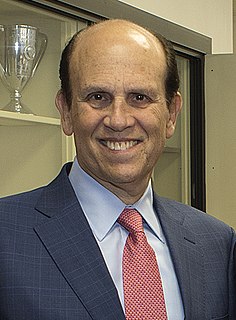A Quote by Ronald Reagan
We have to realize that this country in its private sector has been fighting the most successful war on poverty the world has seen for the last 200 years.
Related Quotes
It's just the banks who are the latest target of the American socialist left. There is a war on the entirety of the private sector. It is the private sector that employs most of you, that services most of you, that creates the economic prosperity that our nation has enjoyed - and there is a war on that private sector, and it's being waged from the Oval Office, and its foot soldiers are on Wall Street and in other cities around the country.
Private sector unionization is down to practically seven percent. Meanwhile the public sector unions have kind of sustained themselves [even] under attack, but in the last few years, there's been a sharp [increase in the] attack on public sector unions, which Barack Obama has participated in, in fact. When you freeze salaries of federal workers, that's equivalent to taxing public sector people.
Small and mid-sized companies in this country historically have been responsible for creating the overwhelming majority of new jobs in the private sector. One of the most-common misconceptions about our private enterprise system is that large companies, such as the Fortune 500, are integral to the process of job creation in this country. The truth is quite the opposite.
I have seen war. I have seen war on land and sea. I have seen blood running from the wounded. I have seen men coughing out their gassed lungs. I have seen the dead in the mud. I have seen cities destroyed. I have seen 200 limping, exhausted men come out of line—the survivors of a regiment of 1,000 that went forward 48 hours before. I have seen children starving. I have seen the agony of mothers and wives. I hate war.
Liberals cling to the idea that critics of welfare are motivated by greed or callous disregard for the less fortunate. In fact, during the twenty-five years that followed Lyndon Johnson's declaration of war on poverty, U.S. tax payers spent $3 trillion providing every conceivable support for the poor, the elderly, and the infirm. Private foundations spent scores of billions more, and private and religious charities even more. Nevertheless, as Ronald Raegan later quipped, 'in the war on poverty, poverty won.'
Al Gore's problem, in my view, is that he never liked politics. He's actually deeply uncomfortable in it but felt he had to do it because of his father. He's much more comfortable in a private sector role and has, in fact, been much more successful in a private sector role, and I admire him for that.
































